On 17th May 2017, the Central Tibetan Administration (CTA; Tibetan leadership based in Dharamsala, North India), the exile government of the 14th Dalai Lama, released a video with the title ‘Ten Facts About the Missing Panchen Lama’. It was on the occasion of the “22nd anniversary of the enforced disappearance of Gedhun Choekyi Nyima”, the boy that the Dalai Lama had declared to be the reincarnation of the 10th Panchen Lama.
The Department of Information and International Relations (meaning the CTA’s propaganda department) had enlisted the help of a member of the Indian Parliament, Dr Abishek Singhvi to declare the alleged 1995 abduction of Gedhun Choekyi Nyima by the Chinese government as, amongst other things, a “major invasion of the fundamental, spiritual and religious rights of the Tibetan people”. The said video also ascribed a number of adjectives to the Chinese government – harsh, cruel, dictatorial, unrepentant, and unrelenting; it accused the Chinese government of having applied “brute force” in appointing a puppet 11th Panchen Lama who, Dr Abishek declared, will be met with repulsion and rejection.
The elasticity of truth
The 2017 video was then the latest in an ongoing series of CTA-sponsored agitprop with two specific and conjoined purposes — (i) to continue to conjure up whatever controversies were possible such as the Panchen Lama issue in order to undermine the credibility and reputation of China; and (ii) to keep existing fault lines such as the Panchen Lama controversy created in 1995, from repairing.
In its confrontation with China, smear campaigns and the promotion of highly inflammatory issues that could incite social unrest within China were the Dalai Lama and Central Tibetan Administration’s (CTA) weapons of choice, which they wielded with incredible skill. The Dalai Lama, an astute politician who has wielded unfettered power for far longer than any government or dictator in history, knew well what the Chinese feared most, which is expressed in an old Mao dictum – “a single spark can start a prairie fire”. Therefore, creating sparks became an art form of the Tibetan government in exile.
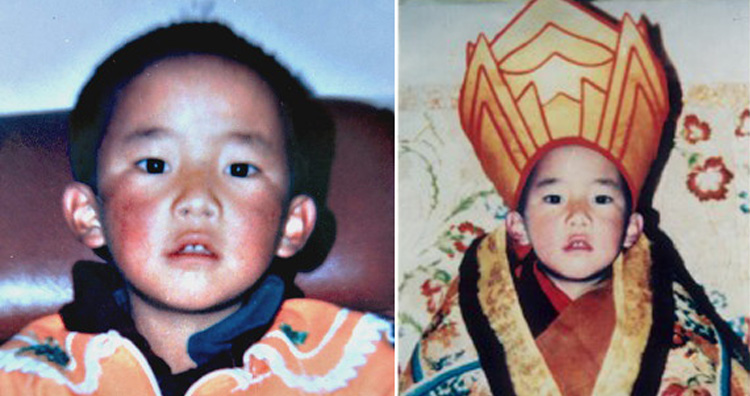
Gedhun Choekyi Nyima, the Dalai Lama’s candidate for the 11th Panchen Lama, who disappeared shortly after he was recognized. A few months later, the Chinese government recognized their own candidate and since 1995, the Dalai Lama has persisted in his claim that the Chinese candidate is a fake and merely a puppet of the Chinese Communist Party (CCP). Then suddenly in April 2018, the Dalai Lama changed his mind and endorsed the Chinese Panchen Lama.
But there are other aspects to the Dalai Lama’s range of armaments in the Tibetan people’s conflict with China — an uncanny ability to find and use knowing and unknowing proxies such as Dr Abishek to broaden the frontage of attack on China, and knowing when to take up and when to let down such allies which were often used as mere collateral.
And so, one year later, on 25th April 2018, the Dalai Lama made a complete mockery out of not only Dr Abishek Singhvi, the Indian Member of Parliament, but also the International Campaign for Tibet (ICT) chaired by Richard Gere, the United Nations, a list of US-based lobbyists and politicians, and even the CTA itself; indeed, everyone who since 1995 had been led by the Dalai Lama to believe that Gyaincain Norbu, whom the Chinese government had recognized and enthroned as the 11th Panchen Lama, to be a fake and merely a political puppet.
In speaking to members of the media on his arrival at Gaggal Airport in Dharamsala, the Dalai Lama said that in the Tibetan Buddhist tradition, it is not unusual for enlightened beings to have as many as five reincarnations, citing the example of a famous Tibetan Buddhist personage.
Taken in context, what the Dalai Lama meant was that both the Chinese-enthroned 11th Panchen Lama (Gyaincain Norbu) and his 1995 candidate, Gedhun Choekyi Nyima are equally rightful heirs to the throne of the Panchen Lama and, in fact, the Dalai Lama acknowledges the Chinese Panchen Lama to be the official 11th Panchen Lama. In essence, what the Dalai Lama said is tantamount to an endorsement of the Chinese-enthroned 11th Panchen Lama Bainqen Erdini Qoigyijabu (Panchen Gyaincain Norbu) and a recognition of his legitimacy as the highest-ranking Tibetan Buddhist lama in Tibet, in the Dalai Lama’s absence.
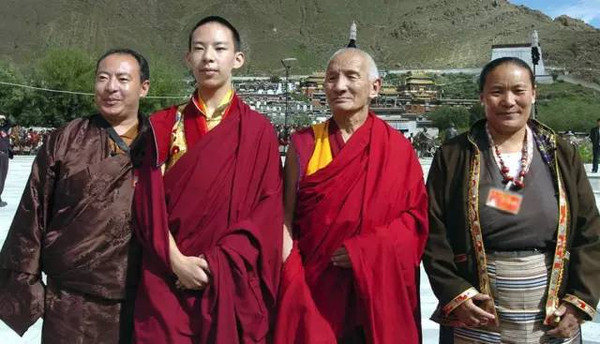
His Holiness the 11th Panchen Lama with his teacher, Kachen Jamyang Gyatso and the Panchen Lama’s parents. Kachen Jamyang Gyatso has tutored the Panchen Lama since he was a young child, and the two share a very close relationship.
The mystery is how a ‘fake’ could have morphed into an authentic 11th Panchen Lama, worthy of the Dalai Lama’s approval and commendation. Clearly, the candidate the Chinese government chose and enthroned has not changed and neither has the Chinese government, the Dalai Lama or the enmity between them. But those who are more familiar with Tibetan Buddhist history would know that this is not the only time the Dalai Lama has made a sudden about-turn on issues which logically cannot alter in its substance in such a casual way. The Dorje Shugden controversy is another whereby the Dalai Lama had personally worshipped this Tibetan Buddhist deity for close to 40 years, even composing one of the most popular praises to him, before suddenly declaring the same deity, Dorje Shugden, to be a malignant force to be shunned.
Effectively, the Dalai Lama was admitting that he had erred on the Panchen Lama issue, a controversy that he had fanned for over 20 years. In 1995, the Dalai Lama had insisted that he could not accept Gyaincain Norbu as having any possibility of being the right Panchen Lama. This was because the Dalai Lama had “conducted all the necessary religious procedures with great care” before naming his own candidate as the reincarnation of the 10th Panchen Lama and that the Dalai Lama’s recognition could not be wrong and “cannot be changed”. His recent remarks however concede that the Chinese government has chosen the correct reincarnation of the 10th Panchen Lama and the methods the Chinese government employ in the recognition process of high tulkus is in fact proper. The Chinese government definitely consulted very high lamas who are in Tibet to use their ancient methods, to recognize the 11th Panchen Lama.
Ironically, the Dalai Lama has himself said on a number of occasions that the tulkus of high lamas guide their own reincarnations and there is no way for any man or force to manipulate or hijack the reincarnation of a highly realized being. That is to say, if the 10th Panchen Lama wanted to take rebirth in a situation whereby he is recognized by the Chinese leadership, then that is exactly what he did. The Dalai Lama also cited the historical example of Khyentse Wangpo of the Sakya tradition as proof that high lamas can take up to five reincarnations – Body incarnation, Speech incarnation, Mind incarnation, Activity incarnation and Qualities incarnation. In fact, the 10th Panchen Lama himself was one of two qualified incarnations, the other being Panchen Otrul Rinpoche who continues to turn the wheel of Dharma in Europe, America and the Far East. This is no secret and the Dalai Lama is fully aware of all this.
So, it cannot be new information that suddenly changed the Dalai Lama’s mind about the Chinese Panchen Lama. But that narrative would not have suited the Dalai Lama’s intended agenda at the time nor would it have been useful to the Tibetan cause for the past 20 years. But it suits the Dalai Lama’s scheme now. And so, we see in this situation a very powerful weapon the Dalai Lama exerts — the ability to bend facts and reality without being questioned. And as the Dalai Lama demonstrates on this occasion, in a mere two minutes, he has created a seismic shift in the Tibetan people’s engagement with China, one that will seal their fate forever.
Whether intended or not, the Dalai Lama has also effectively given his seal of approval to China’s claim as to its capability and sovereign right to be involved in spiritual matters. He has cleared the way of old obstacles for China to get a firm handle on Tibetan Buddhism as an instrument of control, the same power the Dalai Lama has himself wielded for over 60 years with unprecedented deftness.
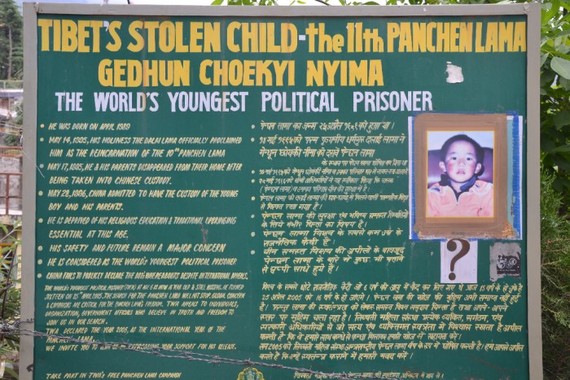
Sign at the entrance of the Dalai Lama’s temple in Dharamsala, India.
In the very same interview at Gaggal Airport on 25th April 2018, the Dalai Lama also reported that Gedhun Choekyi Nyima, whom the Dalai Lama had claimed was kidnapped and has been held prisoner by the Chinese government since 1995, was in fact doing well and is receiving a good education. Since 1995, the Dalai Lama and his supporters have roused the world’s ire against China for allegedly abducting and illegally detaining Gedhun Choekyi Nyima as the world’s youngest political prisoner, and this case has been regularly cited as being a prime example of China’s abuse of human rights. But now, the Dalai Lama’s statement seems to indicate that, far from being abused and denied his human rights, Gedhun Choekyi Nyima has been treated well and even provided with a good education.
This statement is incongruous with the portrayal of the Chinese government by the Tibetan leadership over the decades, i.e. that of an oppressive and brutal regime that ruthlessly disposes of its enemies and those it sees as a threat. However, this incongruity does expose a characteristic of the same Tibetan leadership, that which treats facts and realities as putty to be shaped and moulded to fit shifting agendas.
The characteristic flip-flop of the Dalai Lama
Whilst the latest statement by the Dalai Lama on the Panchen Lama issue seems off-the-cuff, it should be disturbing that the Dalai Lama can be so flippant over something of this magnitude. The reincarnation of such a key figure in the Gelug lineage goes to the heart of Tibetan Buddhism and should never be taken lightly. And yet, this glibness offers a tremendously valuable opportunity to examine the character of the Dalai Lama and Tibetan leadership by exploring possible reasons for the Dalai Lama’s very sudden change of tune regarding a highly-charged issue.
1. The Dalai Lama was genuinely mistaken
The power and prestige of the Dalai Lama comes from his image (be it real or carefully manicured) as a simple Buddhist monk who is the embodiment of all that is good in the world, and who also happens to be a Buddha, and therefore can do no wrong due to his spiritual invincibility. On this premise alone, millions heralded the Dalai Lama’s views and became blind propagators of his ideologies and agendas. The Dalai Lama’s narrative and, by extension that of the CTA, were embraced by fans all over the world and upheld as dogma.
The Dalai Lama’s change of tune now regarding the ‘Chinese Panchen Lama’ sits very uncomfortably with the presumption of his spiritual invincibility but this is not immediately obvious to those who have been trained to merely follow instead of think and rationalize for themselves. If one were to apply logical thought to the issue, then either the Dalai Lama was wrong in 1995 to have proclaimed the Chinese Panchen Lama to be counterfeit, or he is wrong now to declare the Chinese Panchen Lama to be authentic and worthy to be regarded as the “official Panchen Lama” (in the Dalai Lama’s own words).
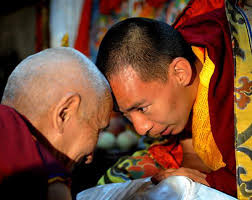
Kachen Jamyang Gyatso is no ordinary teacher. Renown for his scholarship and deep practice, Kachen Jamyang Gyatso’s reputation extends even beyond the borders of Tibet – he is well-known to be an erudite master and seasoned tantric practitioner, so there is little surprise that the Chinese leadership would have selected such a lama to educate His Holiness the 11th Panchen Lama. In this image, the humble teacher greets the humble disciple. You can see from Kachen Jamyang Gyatso’s face that he is very happy to meet his student.
The Dalai Lama cannot be right on both contradictory counts but is it a question of his spiritual competence or a question of his integrity? From the perspective of spiritual examination, the Dalai Lama is said to be none other than the Buddha of Compassion, the great and all-knowing Avalokiteshvara or Chenresig. The Panchen Lama in turn is the Buddha Amitabha. Both are Buddhas and if this is true, how can one Buddha (Dalai Lama) be mistaken in recognizing another Buddha (Amitabha) when both are supposed to be of the same awakened essence? To suggest so would be to assail the very foundations of Buddhism. In short, it can only be a question of human integrity and not a question of spiritual efficacy.
Either the entire corpus of Buddhism is formulated on false assumptions or the Dalai Lama is a mere human being and subject to faults, mistakes and vices. Either way, it should be clear now that it would be a grievous error to blindly follow a leader on the presumption of soundness and trustworthiness in everything he does and proclaims. And if there is a case to be made for the human fallibility of the Dalai Lama, then one should also call into question the Dalai Lama’s endorsement of Ogyen Trinley Dorje as the 17th Karmapa; he was one of three claimants but the Dalai Lama proclaimed him to be the only correct and rightful throne holder of the Karma Kagyu lineage. It would also mean that the Dalai Lama very likely erred when he declared the Dharma Protector Dorje Shugden to be a demonic force after he himself worshipped the deity for close to 40 years.
History will judge how the Dalai Lama, the supposed personification of compassion, could have allowed so many innocent and unknowing people to attack and denounce the Panchen Lama, the living Amitabha Buddha; the Karmapa, the living Bodhisattva Chenresig Simhanada; and Dorje Shugden, an enlightened being with a lineage that is over 300 years old, at a karmic cost that would be frightening if it could be calculated.
2. Political expediency overrides spiritual truth
It is common knowledge that the Dalai Lama and the CTA have increasingly been given the cold shoulder by world leaders as the Tibetan issue becomes a dangerous liability and burden. India is the latest to keep the Dalai Lama and the Tibetan exile government at arm’s length, after almost 60 years of unprecedented support for the Tibetan cause. It was only with the blessings of the Indian government that the Tibetan leadership was able to form and function as a government without a country and without any accountability whatsoever. No other ‘government’ in the world enjoys such a privilege and with India’s permission, the Dalai Lama and the CTA have been emboldened to traverse the world and spread enmity against China.
In the meantime, countless NGOs and charitable organizations have sprouted globally, all collecting funds in the name of the Tibetan struggle. On top of this is funding from the United States of America which came as aid for the Democratic David in his struggle with a Communist Goliath. Little is known of how much or how little of these funds actually reach the poor Tibetan refugees but clearly, the CTA very quickly realized that it is very lucrative to be a thorn in China’s side, and that being in exile offers financial rewards they could not have received as a legitimate government. All they really had to do was remind the world of China’s oppression and Tibet’s ‘victimization’ by a vicious Chinese monster.
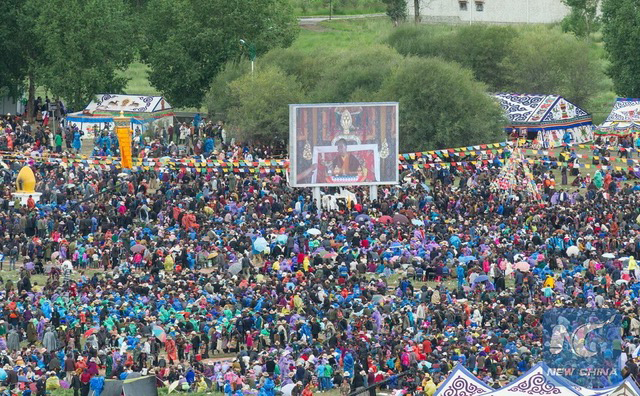
Large turnout at the 11th Panchen Lama’s Kalachakra initiation in 2016, marking the revival of Tibetan Buddhism in Tibet.
But now, with India changing its stance on China and preferring to formulate a new friendship with her mighty neighbor, the Dalai Lama and CTA may soon find themselves without their main sponsor. Left with little choice, the Dalai Lama now feels the need to appease China instead of irking her as he and the CTA have done for the past 60 years, all the while blaming the failure of the Tibetan people to return home on China’s refusal to come to the negotiating table.
The Dalai Lama’s endorsement of the Chinese Panchen Lama comes only days before an all-important closed door meeting between India’s Prime Minister Narendra Modi and China’s President Xi Jinping. It is expected that the Tibetan issue is on the agenda along with other border issues affecting Sino-Indian relationships.
In this context, the Dalai Lama’s change of tune is consistent with his other dramatic shifts including open declarations that “Tibet can remain in China”; that Tibet needs more development, which itself is a clear acknowledgment that the Chinese government have created benefits for the Tibetan people; and expressing his wish to return to Tibet as an individual as opposed to being a key person in the Tibetan people’s political struggle against China. In proclaiming that highly realized beings like the 10th Panchen Lama could have taken more than one reincarnation, the Dalai Lama provides an avenue that legitimizes the Chinese Panchen Lama and, in effect, signals an end to Tibetan aggression towards China and perhaps the beginning of a new era of engagement. In this way, the Dalai Lama shows himself to be an astute politician to give away as a bargain, something that would soon be lost to him anyway.
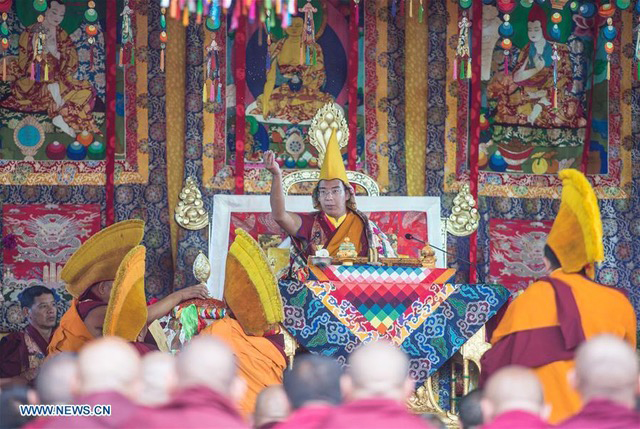
In any case, this new approach of appeasing China seems to be the Dalai Lama’s chosen method at this time to solve the Sino-Tibetan conflict and to pave the way for himself and the Tibetan people to finally return to their homeland. This is the wish the Dalai Lama has harbored for 60 years and which has become more pronounced recently.
However, the Dalai Lama’s conciliatory overtures alone will not work, if it does not translate into official CTA policy. This will not be an easy sell as the likes of Sikyong Lobsang Sangay and Dhardon Sharling will have to face recalcitrant Rangzen warriors and those intoxicated with fumes of hatred for China, fed to them over decades, ironically, by the Tibetan leadership themselves.
No one can predict how well the Tibetan people will take to what is clearly the Dalai Lama’s new strategy. But it is clear that those who refuse to toe the Dalai Lama’s new line with regards to the Chinese Panchen Lama and all that the Panchen Lama stands for, are in fact working against the Dalai Lama and the weakening Tibetan cause. It remains to be seen whether the Tibetan cause will be finally lost because of the external enemies of the Tibetan people or the internal enemies who have sought to derail the Tibetan struggle through a myriad of distractions such as the Dorje Shugden conflict.
Significance of the Dalai Lama’s new proclamation
The Panchen Lama issue is one that has significant spiritual bearing. The Dalai Lama and Panchen Lama are regarded as the Sun and the Moon in the Tibetan Buddhist cosmos. In the absence of the Dalai Lama, the Panchen Lama becomes the highest authority in Tibet, as both a political and spiritual leader. In addition, the Dalai Lamas and Panchen Lamas have interchangeable roles as teachers and students, and are instrumental in finding and recognizing each other’s reincarnations. The office of the Panchen Lama is therefore a highly significant role that the CTA would be highly vested in keeping within their control. It is in fact the gateway to controlling the reincarnation of the 15th Dalai Lama and all future Dalai Lamas and Panchen Lamas.
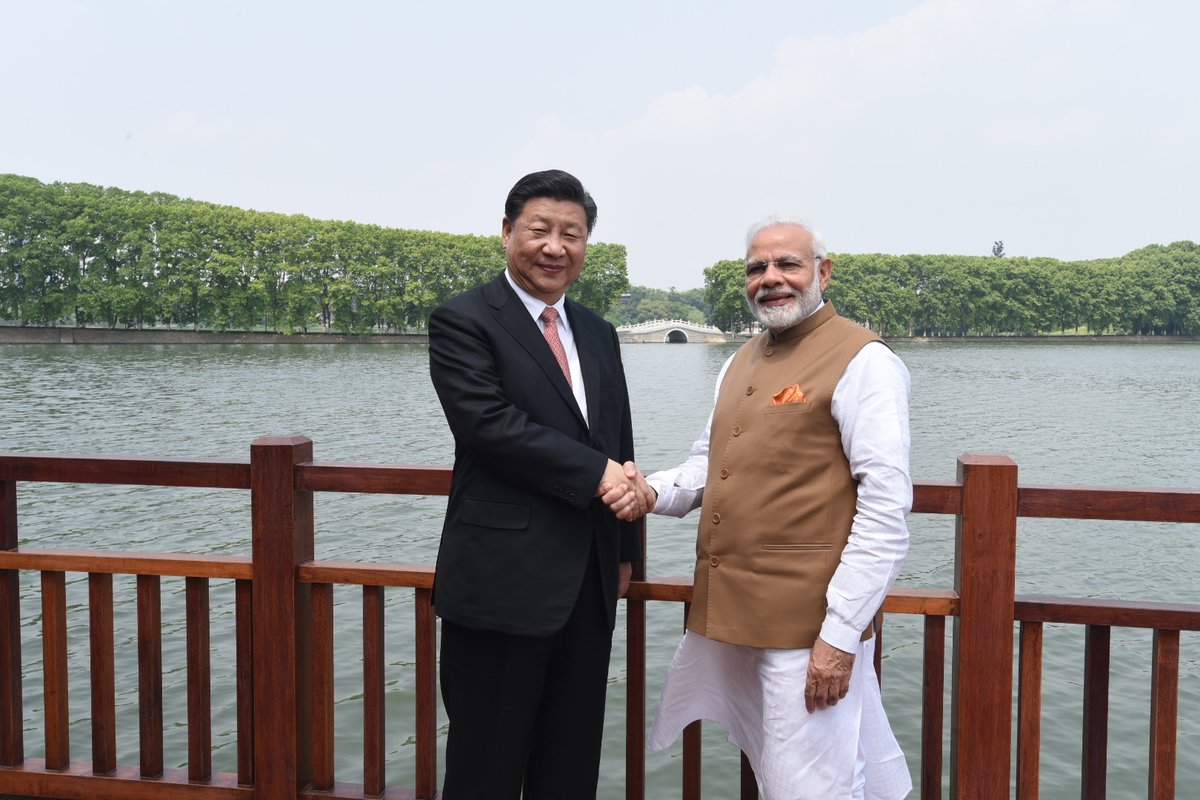
The Central Tibetan Administration (Tibetan exile leadership based in Dharamsala) has been agitating conflict between China and India and Sino-Indian friendship spells doom for the CTA’s game plan.
If the Dalai Lama’s endorsement of the Chinese Panchen Lama is a politically motivated move, then we see clearly that the politician in the Dalai Lama triumphs over his role as a spiritual guardian – the integrity of the so-called Tibetan cause, and the future of the Tibetan nation can be offered up as a sacrifice on the political altar of the Chinese government, so long as the Dalai Lama’s personal wishes are met. If there is any credence in this view, then there should equally be credence in the suggestion that both the Karmapa controversy and Dorje Shugden issue are politically charged contagions introduced into the Tibetan community by the Tibetan leadership, to divide and conquer.
For over 20 years, the Karmapa and Dorje Shugden controversies created intractable schisms within Tibetan communities worldwide. Add into this mix, the Rangzen (total independence) versus Umaylam (meaningful autonomy) debate and pre-existing regional rivalries, and very quickly one sees why the Tibetan freedom movement never really gained traction. These divisive issues were all creations of the Dalai Lama. And now that the Dalai Lama has done a volte-face on the topic of the Chinese Panchen Lama, is it possible that he might one day do the same for the Dorje Shugden ban, as well as his endorsement of the Karmapa Ogyen Trinley? It remains a highly plausible scenario given recent events.
To be very sure, the Tibetan leadership has taken every opportunity in the last six decades to insult China and accuse her of all manner of crimes against humanity. It is left to the imagination what might have happened if the Dalai Lama had used his CTA to bolster the unity of the Tibetan people and instituted conciliatory moves towards China as a matter of policy instead of a desperate and nervous reaction.
Checkmate on the Tibetan struggle
Whether the Tibetan people realize it or not, the Dalai Lama’s endorsement of the Chinese Panchen Lama is the tolling of the bells signaling the death of the integrity of the Tibetan leadership and with that, the Tibetan fight for freedom. The Dalai Lama cannot claim to be a victim of China’s vicious oppression, forced to seek asylum and at the same time openly express his willingness to return to Tibet and come under the sovereignty of this so-called oppressor.
Neither can the Dalai Lama claim that China is committing cultural genocide on the Tibetan people but Tibet should remain in China anyway because of the benefits and development it receives under the Chinese government.
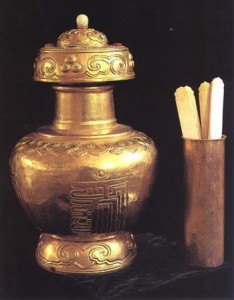
The Golden Urn is traditionally used for confirming the identity of reincarnated lamas, mandated by the Qianlong Emperor in 1792 in the wake of the Nepali invasion of Tibet.
Neither can the Dalai Lama or any Tibetan now argue that China has no right to recognize the next and 15th Dalai Lama when he has openly affirmed the authority of the Panchen Lama who is empowered by tradition and now consent, to do precisely that on behalf of China. Now, not only is China in possession of the Golden Urn, traditionally used in the confirmation of high incarnate lamas, but China also has the 11th Panchen Lama. And as we have already seen, it is the Panchen Lamas who recognize and enthrone the reincarnations of the Dalai Lamas.
Neither can the Dalai Lama say that the Chinese Panchen Lama is a rightful incarnation of the holy 10th Panchen Lama and is an emanation of Buddha Amitabha, but that the same Buddha is also a demon worshipper, because the 11th Panchen Lama is known to be a practitioner of Dorje Shugden.
Finally, neither can the Dalai Lama deny that all his statements are inconsistent with one another and are taken to new heights of absurdity when framed within the ongoing policies and activities of the CTA. The Dalai Lama’s latest stance on the Chinese Panchen lama signals his decision to ‘work with China’ and to cease heaping vitriol upon her via issues such as commenting on China’s human rights record and also the Dorje Shugden controversy which the CTA have falsely claimed to be a ploy by the Chinese government to undermine the Dalai Lama’s reign and destabilize the Tibetan community. This about-turn by the Dalai Lama may be disturbing to those who have held on to his every word as sacred, but it may be the only avenue left for the Tibetans to achieve their fast fading hopes of returning home.
[The Tribune] Panchen Lama alive, having normal education: Dalai Lama

Click to enlarge. (Source: http://www.tribuneindia.com/news/himachal/panchen-lama-alive-having-normal-education-dalai-lama/579684.html)
[The Tibet Post] Panchen Lama alive and receiving normal education: Spiritual leader of Tibet
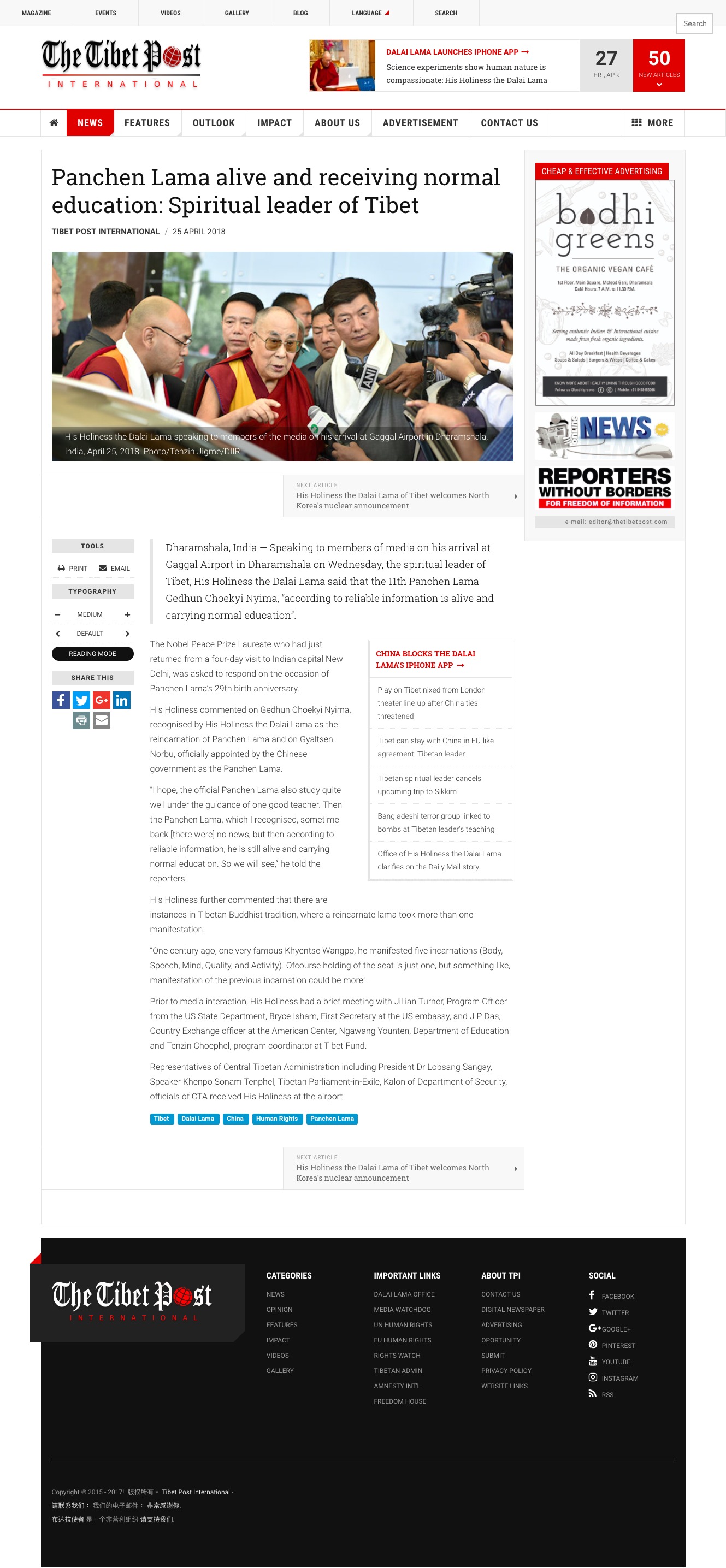
Click to enlarge. (Source: http://www.thetibetpost.com/news/international/6141-panchen-lama-alive-and-receiving-normal-education-spiritual-leader-of-tibet)
[Phayul] “Panchen Lama still alive according to reliable information”, says Dalai Lama
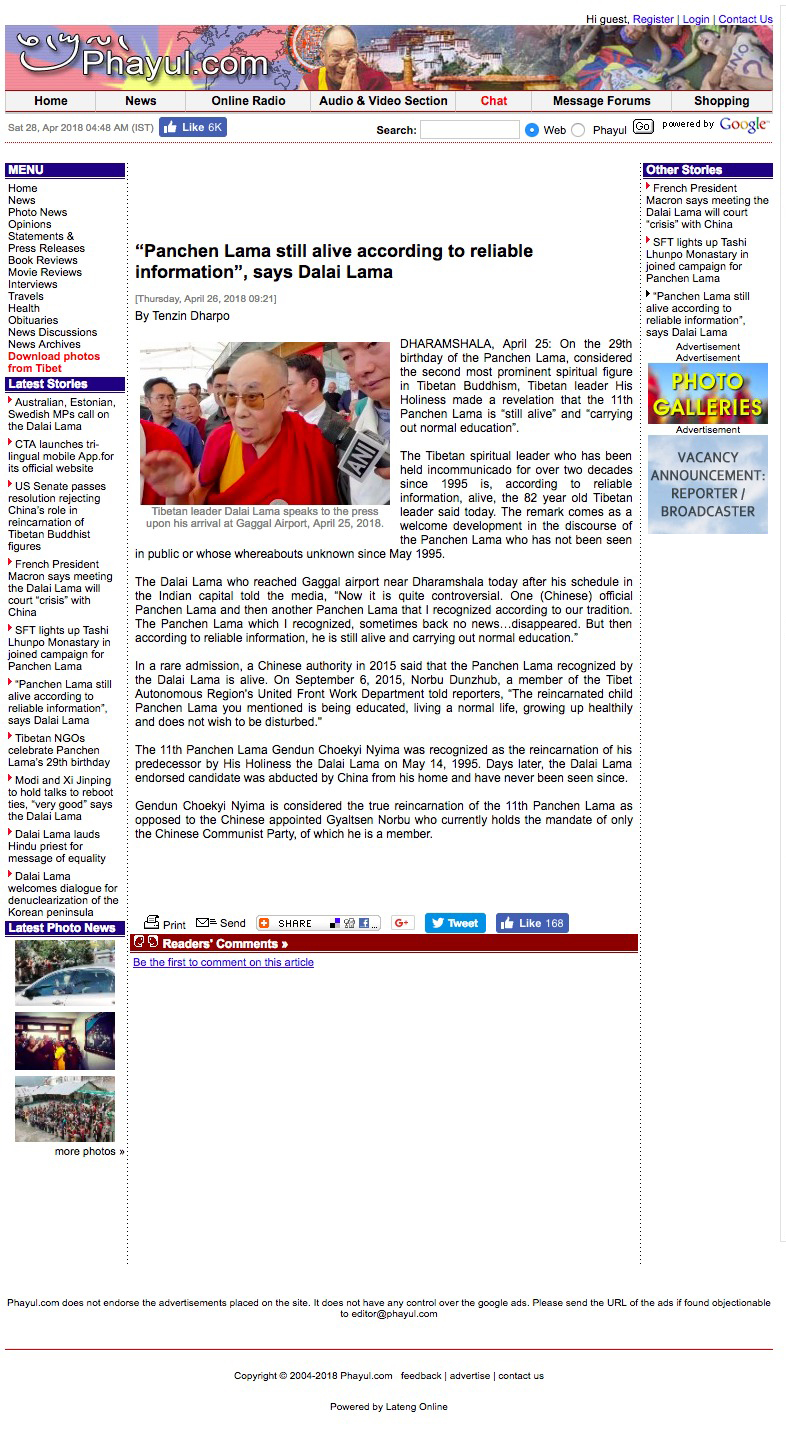
Click to enlarge. (Source: http://www.phayul.com/news/article.aspx?id=40387)
[Himachal Abhi Abhi] बड़ा खुलासा : Dalai Lama बोले जिंदा है 11 वें Panchen Lama, सामान्य जीवन जी रहे हैं

Click to enlarge. (Source: http://himachalabhiabhi.com/dalai-lama-said-according-to-reliable-source-panchen-lama-alive-and-receiving-normal-education.html)
MORE NEWS LIKE THIS